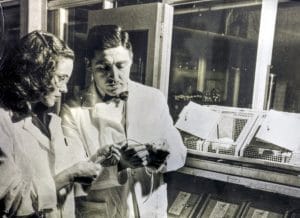Born in Philadelphia, Murray’s mother died from influenza six years later. During World War II, women were encouraged to go into more “male-dominated” professions to take up the slack left by the men going to war. Murray chose chemistry, wanting to do research. She received a job offer from Miles Laboratories, best known as the creators of Alka-Seltzer, but the job entailed quality control, not research. But after a few years, the head of a research group at Miles was looking for a chemist, and she got the job. The lab director, Alfred Free, respected his new chemist’s intelligence, and put her right to work. True to its flagship product, Miles had developed the “Clinitest” tablet that “fizzed” in water for testing diabetic’s urine glucose levels. The first such test of its kind, as it allowed testing to be done at the doctor’s office rather than sending samples to a lab, the research group was assigned the task of making it more sensitive.

Murray and Free developed such a close working relationship that they married after two years, and worked together as a team for the rest of their professional lives. As they improved the test it became so simple that the doctor’s office was taken out of the loop: patients could do their testing at home. Later they developed the “Acetest” for diabetics, and “Icotest” to diagnose hepatitis A. The Frees realized that Miles’ desire to make everything a fizzy tablet was hampering development: they instead developed paper strips for “Dip-and-Read” tests. The ultimate result in 1956 is known by most diabetics: Clinistix. Their “dry reagent” process was the basis of multiple similar tests to follow, including strips with several different kinds of tests (“Multistix”) to do a number of different tests at the same time.
Alfred eventually became the head of Miles’ research laboratory, then vice president for technical services and scientific relations. The Frees retired together in 1982, but Helen stayed on as a consultant to what became Bayer Diagnostics. During her retirement, Free chaired the National Chemistry Week task force of the American Chemical Society, and in 1993 was elected president of the ACS. In 1980 Free was awarded the ACS’s Garvan Medal, honoring distinguished service to chemistry by a woman, the National Medal of Technology and Innovation in 2009, and both the Frees were inducted into the National Inventors Hall of Fame in 2000, shortly after Alfred’s death. Helen Free died May 1, at 98.
